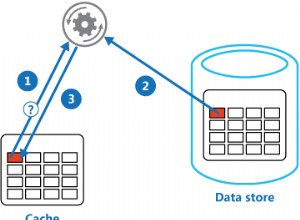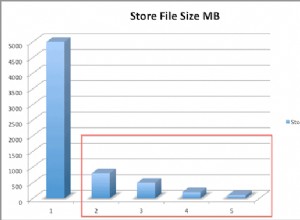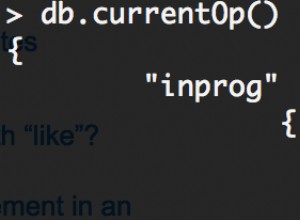यदि आपका MongoDB सर्वर 2.6 या नया है, तो बेहतर होगा कि आप राइट कमांड का उपयोग करें बल्क एपीआई
जो थोक के निष्पादन की अनुमति देता है update
ऑपरेशंस जो सर्वर के शीर्ष पर केवल एब्स्ट्रैक्शन हैं, जिससे बल्क ऑपरेशंस बनाना आसान हो जाता है। ये बल्क ऑपरेशन मुख्य रूप से दो फ्लेवर में आते हैं:
- थोक संचालन का आदेश दिया . ये ऑपरेशन सभी ऑपरेशन को क्रम में निष्पादित करते हैं और पहली राइट एरर पर एरर आउट करते हैं।
- अनियंत्रित थोक संचालन . ये ऑपरेशन सभी ऑपरेशनों को समानांतर में निष्पादित करते हैं और सभी त्रुटियों को जोड़ते हैं। अनियंत्रित थोक संचालन निष्पादन के आदेश की गारंटी नहीं देता है।
ध्यान दें, पुराने सर्वरों के लिए 2.6 से अधिक के लिए एपीआई संचालन को कम कर देगा। हालांकि 100% को कम करना संभव नहीं है, इसलिए कुछ किनारे के मामले हो सकते हैं जहां यह सही संख्या की सही रिपोर्ट नहीं कर सकता है।
आपके तीन सामान्य उपयोग के मामलों के लिए, आप बल्क एपीआई को इस तरह कार्यान्वित कर सकते हैं:
मामला 1. मूल्य बदले बिना संपत्ति के मूल्य का प्रकार बदलें:
var MongoClient = require('mongodb').MongoClient;
MongoClient.connect("mongodb://localhost:27017/test", function(err, db) {
// Handle error
if(err) throw err;
// Get the collection and bulk api artefacts
var col = db.collection('users'),
bulk = col.initializeOrderedBulkOp(), // Initialize the Ordered Batch
counter = 0;
// Case 1. Change type of value of property, without changing the value.
col.find({"timestamp": {"$exists": true, "$type": 2} }).each(function (err, doc) {
var newTimestamp = parseInt(doc.timestamp);
bulk.find({ "_id": doc._id }).updateOne({
"$set": { "timestamp": newTimestamp }
});
counter++;
if (counter % 1000 == 0 ) {
bulk.execute(function(err, result) {
// re-initialise batch operation
bulk = col.initializeOrderedBulkOp();
});
}
});
if (counter % 1000 != 0 ){
bulk.execute(function(err, result) {
// do something with result
db.close();
});
}
});
मामला 2. मौजूदा संपत्ति के मूल्य के आधार पर नई संपत्ति जोड़ें:
MongoClient.connect("mongodb://localhost:27017/test", function(err, db) {
// Handle error
if(err) throw err;
// Get the collection and bulk api artefacts
var col = db.collection('users'),
bulk = col.initializeOrderedBulkOp(), // Initialize the Ordered Batch
counter = 0;
// Case 2. Add new property based on value of existing property.
col.find({"name": {"$exists": false } }).each(function (err, doc) {
var fullName = doc.firstname + " " doc.lastname;
bulk.find({ "_id": doc._id }).updateOne({
"$set": { "name": fullName }
});
counter++;
if (counter % 1000 == 0 ) {
bulk.execute(function(err, result) {
// re-initialise batch operation
bulk = col.initializeOrderedBulkOp();
});
}
});
if (counter % 1000 != 0 ){
bulk.execute(function(err, result) {
// do something with result
db.close();
});
}
});
मामला 3. बस दस्तावेज़ों से गुण निकालना जोड़ना।
MongoClient.connect("mongodb://localhost:27017/test", function(err, db) {
// Handle error
if(err) throw err;
// Get the collection and bulk api artefacts
var col = db.collection('users'),
bulk = col.initializeOrderedBulkOp(), // Initialize the Ordered Batch
counter = 0;
// Case 3. Simply adding removing properties from documents.
col.find({"street_no": {"$exists": true } }).each(function (err, doc) {
bulk.find({ "_id": doc._id }).updateOne({
"$set": { "no": doc.street_no },
"$unset": { "street_no": "" }
});
counter++;
if (counter % 1000 == 0 ) {
bulk.execute(function(err, result) {
// re-initialise batch operation
bulk = col.initializeOrderedBulkOp();
});
}
});
if (counter % 1000 != 0 ){
bulk.execute(function(err, result) {
// do something with result
db.close();
});
}
});




